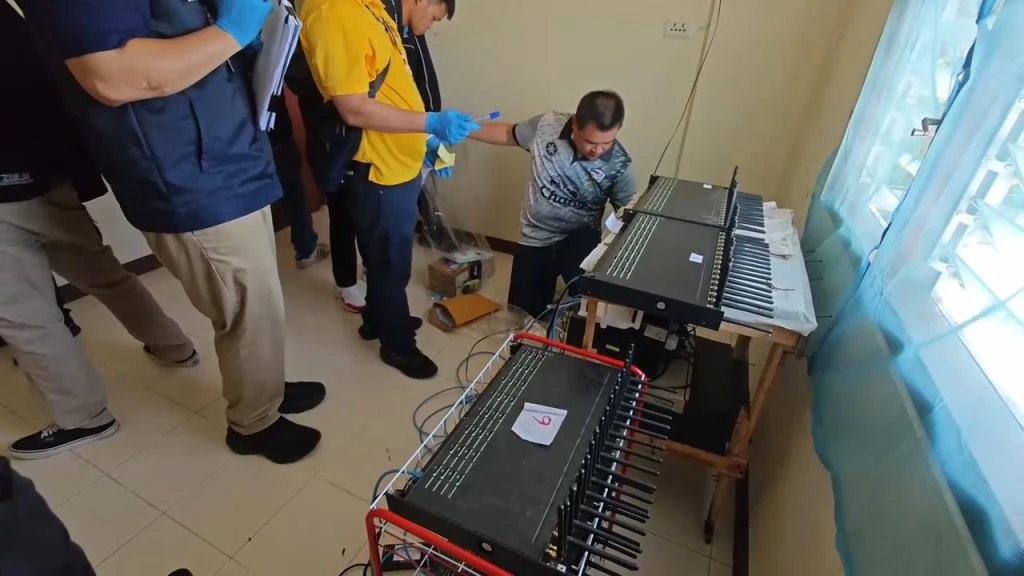Crime
Loses From Cybercrime in Thailand Hit US$193 Million in Only 70 Days

The Cybercrime Investigation Bureau reports that cybercrime in Thailand has cost more than US$193 million in the last 70 days.
During the period, the number of call centre scams decreased, but the number of persons recruited to perform activities to make extra money and loan scams related to the ailing economy climbed.
Meanwhile, mobile phone manufacturer Samsung has introduced an Ad Blocker feature to prevent Samsung Galaxy device users from downloading fraudulent programs or links.
“We saw in the past 70 days that online cases continue to increase and criminals use a mix of techniques to lure potential victims,” said Pol Col Jessada Burinsuchat, superintendent of the Royal Thai Police’s Cyber Security Investigation Unit, part of the Cyber Crime Investigation Bureau.
He also stated that the overall worth of damages over the last 70 days had reached US$ 193,308,554.40 from 53,179 cases. Fraud involving the sale of products and services continued to account for the majority (50%) of all instances, totalling $9,465,262.76.
Scams persuading consumers to make money transfers to earn extra money were the second most popular at 10.6%. Tricks to entice investors accounted for 5.3%, but they caused the most damage, totalling US$88,647,476.00.

“Criminals use technology such as deep fake to lure potential victims and avoid detection.”
There is no silver bullet to prevent this crime, but coordination is needed from all connected stakeholders, such as the National Broadcasting and Telecommunications Commission, telecom companies, and the Bank of Thailand. Pol Col. Jessada explained.
Pol Col Jessada stated that since the government began enforcing the Cyber Crime Prevention and Suppression Act in March 2023, it has helped freeze dubious bank accounts and successfully refunded monies to victims in 24% of cases, up from 2.4%.
Cyber-attacks are causing significant damage nowadays, and the number of occurrences is increasing. According to figures from 2023, there were up to $571,755,400.00 in losses related to 185,814 cyber-attacks, with a daily average of 700-800 instances.
According to Pol Maj Gen Siriwat Deephor, deputy spokesperson for the Royal Thai Police, from March 17, 2023, to the end of 2023, contact centre scams ranked fifth in terms of instances, with losses estimated at $68,610,648.00 in 10,395 incidents.
During that time, the sixth most common method was to lure users into installing malicious programs, resulting in a total loss of $40,022,878.00 from 8,283 cases.
From phishing attacks to data breaches, cybercrime in Thailand is a real issue that impacts individuals and corporations alike. With a population of 70 million and high internet usage exceeding 9 hours per day for each user, Thailand faces significant cybersecurity challenges.

The State of Cybercrime in Thailand
Thailand has experienced a rise in cybercrime in recent years, with various cyber attacks targeting businesses and individuals. According to statista.com, the country has seen increased phishing scams, data breaches, and identity theft cases. These cyber threats have caused financial losses and eroded trust in online transactions and data security.
Furthermore, the Cybersecurity Laws and Regulations Report 2024 Thailand highlights the legal framework to address cybercrime in Thailand. Offences related to cybercrime are covered under the Telecommunications Business Act B.E. 2544 (2001) and its subsequent amendments, providing a legal basis for prosecuting cybercriminal activities.
Initiatives to Combat Cybercrime
The Thai government and law enforcement agencies have proactively implemented cybersecurity measures to address the growing concerns around cyber threats. The Thailand-Octopus Cybercrime Community is actively tackling cybercrime by enforcing existing laws and regulations while collaborating with international partners to combat transnational cyber threats.
Moreover, a concerted effort has raised awareness about cybersecurity best practices among businesses and the general public. Educational campaigns and workshops have been organized to educate individuals on identifying and mitigating cyber risks, ultimately fostering a more cyber-resilient society.
As cyber threats continue to evolve, Thailand is focused on enhancing its cybersecurity infrastructure and capabilities. By investing in advanced technologies and fostering collaboration between the public and private sectors, the country aims to create a robust defence against cybercrime.
To sum up, cybercrime in Thailand presents a multifaceted challenge requiring a comprehensive and collaborative approach. With the implementation of stringent laws, proactive enforcement, and enhanced cybersecurity awareness, Thailand is poised to mitigate the impact of cyber threats and safeguard its digital ecosystem.

Crime
Police Officer Being Ordained at Temple Arrested for Running Scam Call Center

Police in Northern Thailand have arrested a fellow officer as he was being ordained at a temple in Ngao district of neighbouring Lampang province.
Pol Lt Col Bandit Khonkan chief inspector from the Hang Dong police station was disrobed and taken to the Chang Puak station in Chiang Mai. He was arrested on charges of running a call centre scam gang in Chiang Mai Province.
According to Thai Media Chiang Mai Provincial Police Region 5 obtained an arrest warrant for Pol Lt Col Bandit on Friday from the Chiang Mai Provincial Court for procuring illegal telecom equipment, setting up a station and using public airwaves to run a telecommunications business without permission.
Pol Lt Col Bandit reportedly told investigators that he was not the ringleader and was only a member of the gang with Chinese partners.
His arrest followed the apprehension of his 26-year-old daughter, Miss Wanuchapond, 26, and three others during raids at three housing projects in Chiang Mai on Friday, Pol Maj Gen Weerachon Boontawee, deputy chief of Provincial Police Region 5 told Thai media.
During the raids police police discovered around 12 GSM gateways, or SIM boxes, which are devices used for converting cellular networks into mobile phone numbers used domestically.
The chief inspectors daughter Miss Wanuchapond told the arresting officers that she was paid 8,000 baht a month at each of the three locations for renting thr rooms and monitoring devices.

She claimed she had no idea what the devices were and accepted the job because the pay was attractive.
Police investigators working with telecom regulators used a special tracking device to monitor the gang’s communications and learned that its base was in Myanmar opposite Mae Sai district of Chiang Rai.
The call center gang used the GSM gateways to make calls over the internet to scam people in Thailand out of million of baht.
The GSM gateways transmitting signals via SIM boxes to convert them into domestic phone numbers, duping victims into thinking they were being called from Thai government agencies.
Pol Maj Gen Weerachon said that each SIM box held 32 SIM cards, with a capacity of up to 300,000 calls a month. The seized devices had made fraudulent calls over 3.6 million times.
He said the their investigation is ongoing and they are working to track down the remaining conspirators, including Chinese and other Thai suspects.
Authorities are still deciding whether Pol Lt Col Bandit will be dismissed from the force, he said, adding that so far, no other officers are known to have been involved.

Meanwhile, Prime Minister Settha Thavisin has authorized the establishment of an emergency cyber center operated by the Royal Thai Police to combat transnational crimes committed by call center gangs along the Thai border in Chiang Rai province.
On July 19, Prime Minister Settha Thavisin directed the Center to combat information technology crimes. The Royal Thai Police (Royal Thai Police) will crack down on call center gangs in Myanmar, Laos, and along the border.
His directive comes as call center gangs ratchet up their scams to defraud people of their money, causing concern among Thais and jeopardizing the country’s economic and social stability.
Related Police News:
Machete Wielding Man Shot an Killed by Police in Chiang Rai
https://www.chiangraitimes.com/chiangrai-news/machete-wielding-man-shot-an-killed-by-police-in-chiang-rai/
Crime
Thai Immigration Police Arrest Colombian Tourists Over Home Invasions

Immigration police officers have arrested four Colombian nationals in connection with a series of home burglaries at luxury housing complexes in the Bangkok metropolitan area and Chiang Buri Province.
Pol Maj Gen Panthana Nuchanart, deputy commissioner of the Immigration Bureau, told a press briefing that three of the suspects were apprehended in Nonthaburi Province and the fourth in South Pattaya, Chon Buri Province.
According to the Bangkok Post, the Colombians were charged with stealing conspiracy and seized around 3 million baht (US$82,500.00).
According to Pol Maj Gen Panthana, the criminals rode motorcycles through housing estates, scoping out the properties and waiting for the owners to depart before committing their crimes.
He stated that all four of the accused denied any involvement in the home break-ins, but the arresting squad discovered evidence that implicated them.
Police called to home invasion
Meanwhile, police were dispatched to a luxury housing development in Tambon Nong Prue, Chonburi Province, after a Chinese man was attacked during a house invasion.
When they arrived, they discovered the house owner, Mr. Qian Peng Yi, visibly scared and with marks from being tied up with a cable. He informed police that three Chinese males broke into his home at 9 p.m., one of whom brandished a gun at him and directed him to his bedroom.
They bound his hands and feet, gagged him with fabric, taped his head, and forced him into the bed. The intruders then attempted to compel him into transferring 10 million baht in cryptocurrencies to them, endangering the life of his 33-year-old cousin who was in a second-floor bedroom.
While they scoured the house in search of riches, Mr. Peng Yi managed to flee and hide; he subsequently observed them leave with his cousin. Officials investigated the property and analyzed security camera footage from the incident and surrounding areas.
Around 9 p.m., a 30-year-old van driver came at the Bang Lamung police station after being contacted by an agency to carry Chinese customers from Pattaya to Suvarnabhumi Airport.
The driver informed authorities that he was supposed to pick them up at a motel about a kilometer from the Chinese businessman’s home. He then drove them to Bangkok’s Suvarnabhumi airport, arriving at 1 a.m. and receiving 1,800 baht.
The driver took a snapshot of the group smoking at the airport gate and identified one of them as the victim’s cousin. Police suspected coordination between her and the three suspects in her cousin’s heist, who all departed Thailand on the same aircraft.
Other Bangkok News:
Police in Bangkok Discover Six Vietnamese Tourists Dead in 5 Star Hotel
Police in Bangkok Discover Six Vietnamese Tourists Dead in 5 Star Hotel
Crime
Son of Thailand’s Leading Legal Scholar on Corruption Arrested for Running Online Gambling Network

The son of a former senator and leading economist and expert on corruption and gambling in Thailand has been arrested for on charges of running an online gambling network and its payment system.
Police from Thailand’s Technology Crime Suppression Division (TCSD) have confiscated assets worth more than (US$ 11.1 million) 400 million baht.
Narote Piriyarangsan, 33, was arrested following crackdowns in three sites around the city, according to Pol Maj Gen Athip Pongsiwapai, commander of the police Technology Crime Suppression Division (TCSD).
Mr Narote’s father, Sangsit Piriyarangsan, is an economist who has written articles and books about corruption and gambling. He was one of the appointed senators that were investigating the government’s intention to legalize casino gaming before their terms expired.
Police also detained 39-year-old Narayut Narakaew, the owner of the gambling website 69pgslot.com. The Criminal Court issued arrest warrants for the couple for operating an internet gambling service and money laundering.
According to the Bangkok Post, police seized two desktop computers, one laptop computer, 14 mobile phones, 21 bank passbooks, 53 ATM cards, and four high-end cars — a Ferrari 926 GTS, an Aston Martin, a Lexus, and a Subaru — totaling more than 400 million baht.
Police launched the inquiry after discovering the online gambling site, which accepted funds via an automatic deposit-withdrawal system through bank accounts and deposits in the AskMePay system. Players scanned the VPay QR code as well as the QR codes for Heng Online 888 or Heng Pay Company.
Police also discovered that payments received via QR code scans were transferred to the account of Heng Pay Co and then to the gambling website’s mule accounts using AskMePay, which did not use banks’ face recognition scanning. An inquiry indicated a monthly turnover of approximately 5 billion baht.
According to investigators, the website has been up and running for around four years, with the payment mechanism in use for roughly eight months.
According to Pol Maj Gen Athip, Mr Narote owns the gaming website’s payment systems and is the director of Heng Pay Co. After gathering evidence, authorities requested arrest warrants for 14 people.
Thailand does not allow almost any kind of gaming. Even though the law doesn’t say anything specific about online gaming, it is still considered gambling. The country has pretty strict rules about gambling. Thai punters can bet on the national lottery and horse races, but they can’t bet on any other types of games.
But it’s not a secret that there is a huge illegal gaming business in Thailand, even though it’s illegal.
The illegal casinos, online betting shops, underground lotteries, and pop-up bookies that take bets on everything from cockfights to Muay Thai make a shadow economy that is worth billions of dollars every year.
Related News:
Thailand’s Cyber Crime Police Raid Top Cops Home Over Gambling Websites
Thailand’s Cyber Crime Police Raid Top Cops Home Over Gambling Websites
-

 News3 years ago
News3 years agoLet’s Know About Ultra High Net Worth Individual
-
Entertainment2 years ago
Mabelle Prior: The Voice of Hope, Resilience, and Diversity Inspiring Generations
-

 Health4 years ago
Health4 years agoHow Much Ivermectin Should You Take?
-

 Tech2 years ago
Tech2 years agoTop Forex Brokers of 2023: Reviews and Analysis for Successful Trading
-

 Lifestyles3 years ago
Lifestyles3 years agoAries Soulmate Signs
-

 Movies2 years ago
Movies2 years agoWhat Should I Do If Disney Plus Keeps Logging Me Out of TV?
-

 Health3 years ago
Health3 years agoCan I Buy Ivermectin Without A Prescription in the USA?
-

 Learning3 years ago
Learning3 years agoVirtual Numbers: What Are They For?